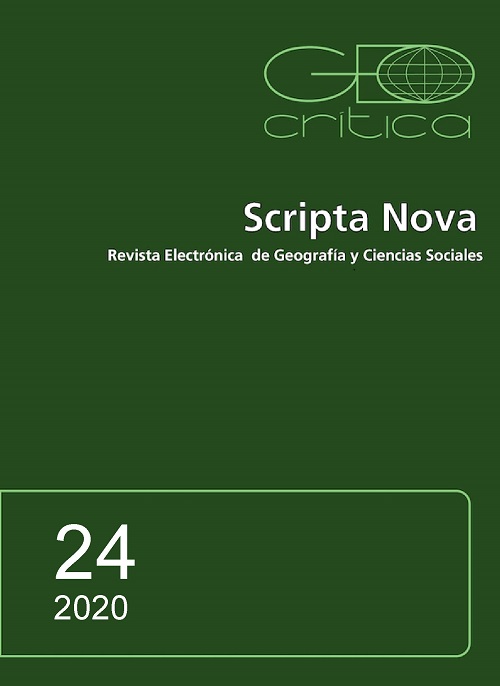650. The paradigm of commonality and the energy management in Spain: opportunities for convergence between differents
DOI:
https://doi.org/10.1344/sn2020.24.30368Keywords:
energy, alternative, commons, transversality, gradualityAbstract
In the search for alternatives of the current energetic model, capable of promoting the ecological and social transition, the renewed commons paradigm and its crystallization in the Spanish energy field seems to open the door to a real possibility of convergence between heterogeneous and disparate practices. Through the identification and qualitative analysis of local (self) transformative practices that, in a democratic and cooperative way, promote an eco-social transition in the field of energy, this article shows the transversality potential of the commons paradigm. Moreover, it highlights how the commons allow the mutual recognition of heterogeneous practices that from the local collective action share the same horizon in response to problems that have reached a global dimension.References
BYRNE, John, y GLOVER, Leigh. A common future or towards a future commons: Globalization and sustainable development since UN. International Review for Environmental Strategies, 2002, vol. 3, nº 1, pp. 5-25. CALLE, Angel y VILAREGUT, Ricard. Territorios en democracia. El municipalismo a debate. Barcelona: Icaria, 2015. CHAMOUX, Marie Noelle y CONTRERAS, Jesús. La gestión comunal de los recursos. Economía y poder en las sociedades locales de España y América Latina. Barcelona: Icaria, 1996. DARDOT, Pierre. Lo común y la cuestión de la institución. Revista Castalia, 2019, nº 32, pp. 5-15. <http://revistas.academia.cl/index.php/castalia/article/view/1323/1437> (consulta: 2 de diciembre de 2019). DI MUZIO, Tim. Carbon Capitalism. Energy, Social Reproduction and World Order. London, New York: Rowman Littlefield, 2015. GREENPEACE. Energía colaborativa. El poder de la ciudadanía de crear, compartir y gestionar renovables. Madrid: Greenpeace España. 2017. HARVEY, David. El “nuevo” imperialismo: acumulación por desposesión. Buenos Aires: Clacso, 2005. HARVEY, David. Rebel Cities: From the Right to the City to the Urban Revolution. London, New York: Verso, 2012. HUERTA, María Guadalupe. El neoliberalismo y la conformación del Estado subsidiario. Política y Cultura, 2005, nº 24, pp. 121-150 <http://www.redalyc.org/articulo.oa?id=26702406> (consulta: 1 octubre de 2019). KLEIN, Naomi. Reclaiming the commons. NewLeftReview, 2001, nº 9, pp. 81-89 <http://newleftreview.org/II/9/naomi-klein-reclaiming-the-commons> (consulta: 2 de diciembre de 2019). KLEIN, Naomi. This Changes Everything: Capitalism vs. the Climate. New York: Simon & Schuster, 2014. LAFUENTE, Antonio. El carnaval de la tecnociencia. Madrid: Gadir, 2007. LAVAL Christian y DARDOT Pierre. Común. Ensayo sobre la revolución en el siglo XXI. Barcelona: Gedisa, 2015. MARTÍNEZ-ALIER, Joan. El Ecologismo de los pobres: conflictos ambientales y lenguajes de valoración. El Ecologista, 2005 Nº45. MARTÍNEZ-ALIER, Joan y OLIVERAS, Arcadi. ¿Quién debe a quién? Deuda ecológica y Deuda Externa. Barcelona: Icaria, 2003. MATTEI, Ugo. Bienes comunes. Un manifiesto. Madrid: Trotta, 2013. MIGNOLO, Walter. Historias locales / diseños globales. Colonialidad, conocimientos subalternos y pensamiento fronterizo. Madrid: Akal, 2002. MITCHELL, Timothy. Carbon Democracy political power in the age of oil. London: Verso, 2011. OSTROM, Elinor. gobierno de los bienes comunes. La evolución de las instituciones de acción colectiva. México: Universidad Nacional Autónoma de México, 2011. PRADEL, Marc et al. El momento de la ciudadanía: innovación social y gobernanza urbana. Madrid: Catarata, 2018. RAYNER, Tim. Commoning is making common. Philosophy for change, 2012, <http://philosophyforchange.wordpress.com/2012/03/08/commoning/> (consulta: 5 de diciembre de 2019). RENDUELES, Cesar y SUBIRATS Joan. Los (bienes) comunes, ¿oportunidad o espejismo?. Barcelona: Icària Editorial, 2016. SMIL, Vaclav. Energy in Nature and Society. General Energetics of Complex Systems. Cambridge, London: The MIT Press, 2008. SUBIRATS, Joan. Otra sociedad, ¿otra política? De “no nos representan” a la democracia de lo común. Barcelona: Icaria, 2011. WRIGHT, Erik Olin. Construyendo utopías reales. Madrid: Akal, 2014. ZUBERO, Imanol. De los ‘comunales’ a los ‘commons’: la peripecia teórica de una práctica ancestral cargada de futuro. Documentación Social, 2013, nº 165, pp. 15-48 ZUBIALDE, Xabier. Hacia la soberanía energética de Euskal Herria: crisis y soluciones desde Euskal Herria. Tafalla: Txalaparta, 2016.
Downloads
Published
Issue
Section
License
Los autores que publican en esta revista están de acuerdo con los siguientes términos:
- Los autores conservan los derechos de autoría y otorgan a la revista el derecho de primera publicación, cin la obra disponible simultáneamente bajo una Licéncia de Atribución Compartir igual de Creative Commons que permite compartir la obra con terceros, siempre que estos reconozcan la autoría y la publicación inicial en esta revista.
- Los autores son libres de realizar acuerdos contractuales adicionales independientes para la distribución no exclusiva de la versió de la obra publicada en la revista (com por ejemplo la publicación en un repositorio institucional o en un libro), siempre que se reconozca la publicación inicial en esta revista.





